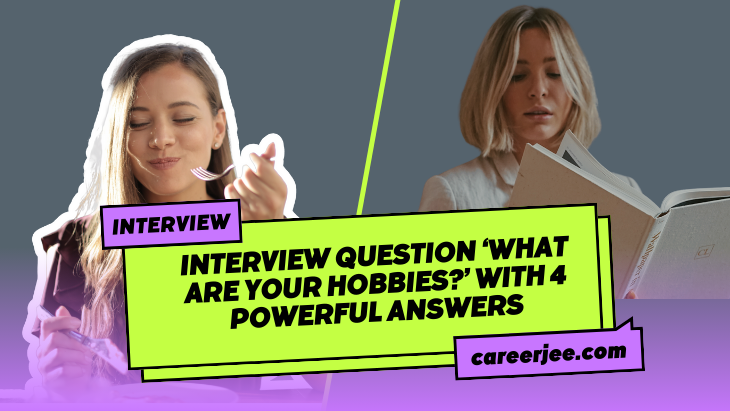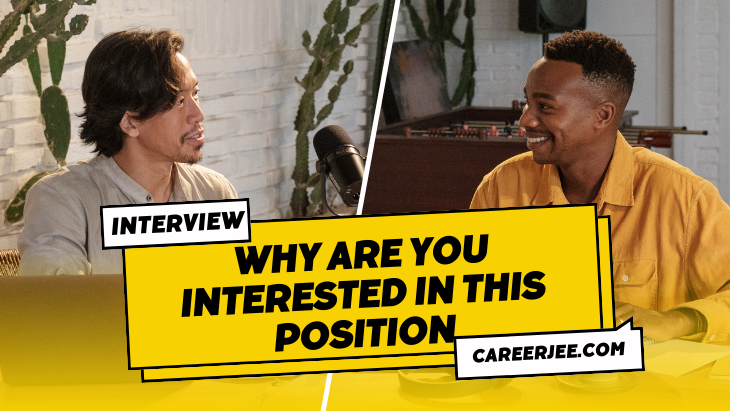Interviewers often pose the question, “What are your hobbies?” or “What do you do in your free time?” But why are they so curious about knowing our hobbies and free time activities? This shows they want to understand our daily routines and how we utilize our time. Moreover, it helps them gauge whether a candidate would fit into their working environment.
Answering this question shouldn’t be casual. Don’t focus on irrelevant hobbies that don’t fit into the role. Let’s delve into this article to explore why this question matters and how to craft a meaningful response.
Why Do the Interviewers Ask This Interview Question ‘What Are Your Hobbies?’
- This question helps the interviewer get to know you better on a personal level and assess your interests and passions outside of work.
- It provides an opportunity for you to showcase your personality and potentially highlight skills or experiences that are relevant to the role.
What Are The Challenges People Face While Answering This Question ‘What Are Your Hobbies?
- Candidates may struggle to find hobbies or interests that are relevant or interesting to discuss in a professional setting.
- Some may feel pressure to present hobbies that they think the interviewer wants to hear, rather than being genuine about their interests.
- It’s important to strike a balance between sharing personal interests and maintaining a professional demeanor during the interview.
What Are The Hobbies You Can Talk About?
- Share hobbies or interests that reflect your personality, values, and passions.
- Highlight activities that demonstrate skills or qualities that are relevant to the role, such as leadership, teamwork, creativity, or problem-solving.
- Be prepared to explain why you enjoy your hobbies and how they contribute to your overall well-being and personal development.
What Are The Hobbies You Shouldn’t Talk About?
- Avoid mentioning hobbies that could be controversial or inappropriate for a professional setting.
- Don’t feel pressured to list hobbies just because you think they’ll impress the interviewer; be genuine and authentic in your response.
- If you have hobbies that are unrelated to the job or industry, you can still mention them briefly, but focus more on the skills or qualities they demonstrate rather than the activity itself.
Sample Answers For Freshers:
Sample Answer: 1
For a fresher applying for an entry-level Marketing Assistant role: “I’m passionate about graphic design and enjoy creating visually appealing content that tells a story. During my studies, I took several courses in graphic design and completed internships where I gained hands-on experience with Adobe Creative Suite. I also enjoy blogging about marketing trends and strategies, which has helped me stay informed about the industry and develop my writing skills. Additionally, I’m a member of the marketing club at my university, where I’ve had the opportunity to collaborate with peers on projects and campaigns. Overall, my hobbies in graphic design and marketing align well with the requirements of this role, and I’m excited about the opportunity to contribute my skills to your team.”
Sample Answer: 2
For a fresher applying for an entry-level Software Developer role: “One of my hobbies is coding and programming, which I’ve been passionate about since high school. I’ve completed several online courses and personal projects to develop my skills in languages like Java and Python. For example, I recently built a mobile app that helps users track their fitness goals and progress, which taught me valuable lessons in user interface design and database management. I’m also an active participant in coding competitions and hackathons, where I enjoy collaborating with others to solve complex problems under pressure. My hobby in software development has not only deepened my technical expertise but also taught me important lessons in teamwork, problem-solving, and perseverance.”
Sample Answers For Experienced:
Sample Answer: 1
For an experienced Marketing Manager: “I’m an avid traveler and enjoy exploring new cultures and destinations. My passion for travel has not only enriched my personal life but also inspired my work in marketing. I’ve had the opportunity to lead global marketing campaigns for travel and hospitality brands, leveraging my firsthand experiences to create authentic and compelling content that resonates with audiences around the world. Additionally, my hobby in photography allows me to capture and share the beauty of my travels, which has been instrumental in creating visually engaging marketing materials and social media content. Overall, my hobbies in travel and photography complement my professional experience in marketing and contribute to my creativity and storytelling abilities.”
Sample Answer: 2
For an experienced Software Engineer: “Outside of work, I’m an active contributor to open-source projects and enjoy collaborating with other developers to solve real-world problems. My passion for coding extends beyond my day job, and I’m constantly exploring new technologies and experimenting with innovative solutions. For example, I recently contributed to a project that aims to make coding more accessible to beginners, which aligns with my belief in the power of technology to drive positive change. Additionally, I’m a mentor at coding boot camps and online forums, where I share my knowledge and experience with aspiring developers. My hobby in software development not only keeps me engaged and motivated but also allows me to give back to the community and support the next generation of coders.”
1: Should I mention hobbies that are unrelated to the job? While it’s generally best to focus on hobbies that demonstrate relevant skills or qualities, such as creativity, problem-solving, or teamwork, you can still mention hobbies that are unrelated to the job if they’re important to you. Just be prepared to explain how your hobbies contribute to your overall well-being and personal development, and how they may indirectly benefit you in your professional life.
2: How do I decide which hobbies to mention in my response? Choose hobbies that you’re genuinely passionate about and that reflect your personality, values, and interests. Consider how your hobbies contribute to your overall well-being and personal growth, and whether they demonstrate any relevant skills or qualities that could be beneficial in a professional setting. Ultimately, the goal is to give the interviewer a glimpse into who you are outside of work and showcase your unique personality and strengths.
3: Is it okay to mention hobbies that are considered unconventional or niche? Absolutely! Your hobbies are a reflection of your interests and passions, so don’t be afraid to share activities that may be less common or mainstream. In fact, unique hobbies can often spark interesting conversations and help you stand out from other candidates. Just be prepared to explain why you enjoy your hobbies and how they contribute to your personal growth and well-being.
4: Should I mention hobbies that are physically demanding or potentially risky? It’s okay to mention hobbies that involve physical activity or adventure, as long as they’re safe and appropriate to discuss in a professional setting. However, be mindful of the context and audience, and avoid mentioning hobbies that could be perceived as overly risky or dangerous. Focus on highlighting the positive aspects of your hobbies and how they contribute to your overall well-being and personal development.
5: How do I strike the right balance between sharing personal information and maintaining a professional demeanor? While it’s important to be genuine and authentic in your response, it’s also important to maintain a level of professionalism during the interview. Focus on sharing hobbies and interests that are appropriate for a professional setting and avoid oversharing or providing too much personal detail. Keep your responses concise and relevant to the question, and remember to always present yourself in a positive and professional manner.
Interview Question ‘What Are Your Hobbies?’ With 4 Powerful Answers


